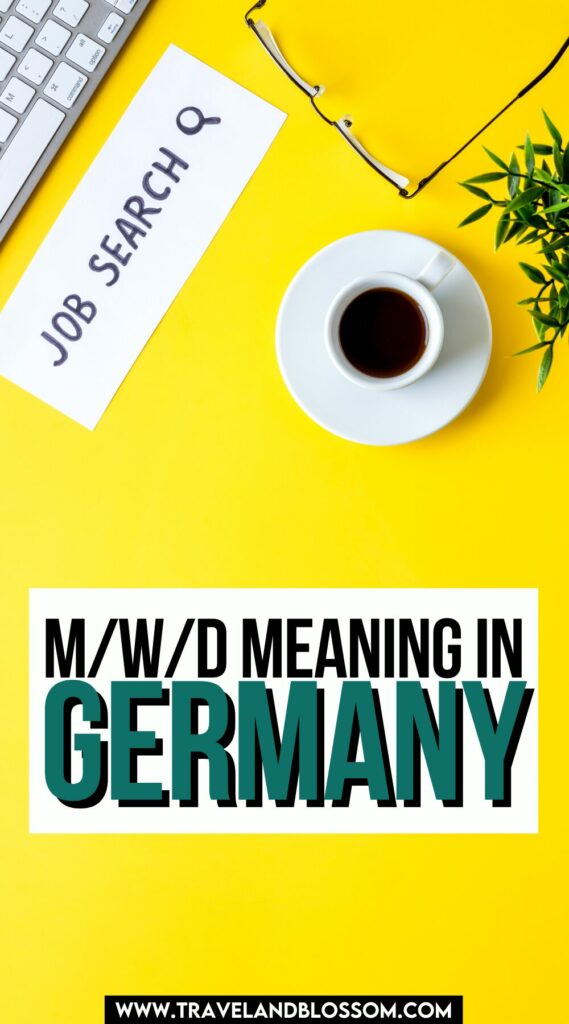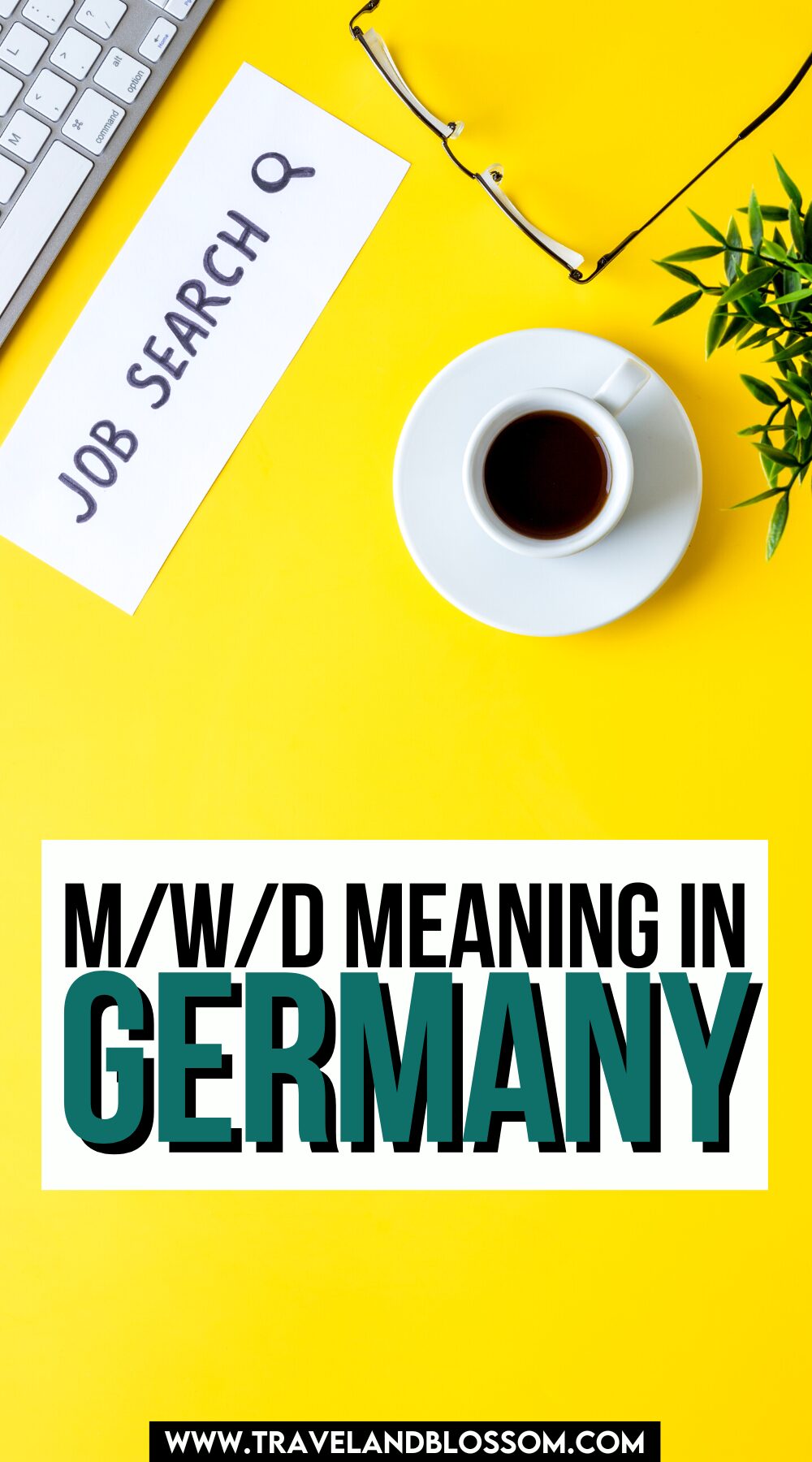
Looking for a job in Germany but confused by the m/w/d meaning? Check out this post to learn what the m/w/d means for every German job posting!
As someone who has applied for a job in Germany, I will say I was a little confused by the “m/w/d” abbreviations on every job posting I saw. At first, I thought they stood for “Monday, Wednesday, Thursday” but… that didn’t make sense since “Wednesday” in German starts with an M.
But anyways, I figured if I was confused by the “m/w/d” abbreviation as a foreigner then I’m sure someone else must have been confused too. Therefore, if that’s you, you’ve come to the right place. This post alone highlights the meaning behind the “m/w/d” abbreviation in job postings and where it originates.
German Language & Culture Series
P.S. This is a post in my German Language & Culture series. Here is the complete series:
German Addresses: German Address Format: How to Mail a Letter to Germany
German Time: The Non-Native Speaker Guide to Telling Time in German
German Greetings: The 10 Most Common German Greetings and Introductions
German Numbers: The Ultimate Guide for Learning German Numbers 1 to 100
German Alphabet: The Best Alphabet Guide of All Time
German Days of the Week: A Beginner’s Guide to the Days of the Week in German
German Emails: The American Guide to Writing German Emails
German Body Parts: A Step-by-Step Guide to the Body Parts in German
German Vegetables: The Ultimate Guide to Vegetables in German
German Pronouns: The American Guide to Learning German Pronouns
German Colors: Colors in German: A One Stop Resource
German Fruits: Fruits in German: What You Need to Know
German TV: 10 German TV Shows You Need to Watch
German Curses: German Swear Words: What You Need to Know
German Idioms: 10 German Idioms Every American Should Know
What does the M/W/D abbreviation mean?
The “m/w/d” abbreviation in Germany stands for mannlich, weiblich, and divers in German which in English translates to “male, female and diverse”. These three words give reference to different gender identities someone could have as a job applicant. Having this on a job description in Germany ensures to the job applicant that the position is open to all genders even if the job title is written in Germany’s masculine form -er. For example, these job titles could be Bauarbeiter, Polizeibeamter, or Software-Entwickler.
What are some alternative abbreviations to the M/W/D abbreviation?
Some alternative abbreviations to the “m/w/d” abbreviation include:
- d/w/m
- This abbreviation stands for divers, weiblich, and mannlich and is sometimes used to avoid putting men first and diverse people last.
- m/w/a
- This abbreviation stands for mannlich , weiblich, and anders and the word anders is used to refer to “other” in regards to gender.
- m/w/gn
- This abbreviation stands for mannlich , weiblich, and geschlechtsneutral and the geschlechtsneutral is used to refer to people who are gender-neutral.
- m/w/i
- This abbreviation stands for mannlich , weiblich, and intersexuell and the intersexuell is used to refer to people who are intersexual.
- m/w/x
- This abbreviation stands for mannlich , weiblich, and x with “x” being a placeholder for people whose gender is undefined.
Why is the M/W/D abbreviation on every German job posting?
This is because of the General Equal Treatment Act that came into effect in Germany in 2006. There it states that employers are not allowed to discriminate against a job applicant due to their gender. This, however, shouldn’t just include “male” and “female” since the gender identities of people in general are diverse. So, as a result, recruiters must consider this in their job postings to avoid being discriminatory towards people who have other gender identities.
When did the M/W/D abbreviation come into fruition?
The m/w/d abbreviation specifically came into fruition when the Federal Constitutional Court in Germany made a decision to change the country’s civil laws in order to respect the rights of people who identify as non-binary/intersex in Germany in 2017. So, in other words, the German Federal Constitutional Court ruled that civil status law must allow a third gender option besides “male” or “female” to be accommodating towards people who cannot or do not want to be assigned to any gender within the societal gender binary system. Allowing them to protect their “right to personality” like any other human being on Earth.
Do Germany’s gender regulations also affect the recruitment process?
Yes, Germany’s gender regulations also affect the labor law when it comes to the recruitment process. For example, it is considered good practice for companies/employers to:
- Hold on to any documentation for each application process for at least three months after rejecting an applicant
- Have detailed and specific selection criteria for applicants
- If possible, use a fixed questionnaire during interviews
- Have at least two representatives of the employer present during the interviewing process
- Send out refusal letters that are gender-neutral friendly
What are some other tips for inclusive German job titles?
Some other tips for inclusive job titles in Germany include:
- Using generic or gender-neutral job titles
- For example, some people consider job titles like der Manager to be gender-neutral even though it refers to all genders while being grammatically masculine. Using the plural version of the job title is also an option in Germany since they are assumed to be gender-neutral friendly. In addition, words like Teamleitung (translates to “team management” in English) is also preferred in comparison to Teamleiterin (female title) and Teamleiter (male title), if possible.
- Using an asterisk to avoid gender-specific suffixes
- For example, instead of saying der Manager (male title) or die Managerin (female title), applying an * to the title Manager like so “Manager*” removes any confusion in regards to which gender the job title is targeting.
- Restraining from explaining the last letter of abbreviations like “m/w/d”
- This helps create the underlying idea that gender nor classifications do not matter in general. If recruiters place a huge emphasis on explaining different gender identities outside of the binary norm then it negates the point of being inclusive. Inclusiveness shouldn’t highlight what makes other gender identities different but rather focus on treating a specific gender identity the same way you would treat someone who identifies as male or female.
Do Germany’s gender regulations also apply while you’re on the job?
Yes, expressing gender inclusiveness in Germany should also be seen in the internal communication throughout a company as well as in staff meetings, emails, speeches, dress codes, and office design. For example, in Germany, instead of saying Liebe Mitarbeiter und Mitarbeiterinnen (which translates to the male and female version of “Dear Employees” in English) in a German work email, the greeting Liebes Team (which translates to the gender neutral version of “Dear Team” in English) would be more preferred.
What happens if a recruiter chooses not to add a gender-inclusive job title to a job posting?
This can have legal consequences if the job applicant feels discriminated against after reading a job title/posting. Sometimes lawsuits could be filed because of it but there’s typically no legal basis for penalizing a recruiter/company for an “awfully phrased” job posting.
Overall, I really hope you enjoyed this post on the m/w/d meaning in German job postings! Please let me know in the comments down below which fact about the m/w/d meaning surprised you the most. I would love to hear from you! 🙂
Love this post? Pin it for later!

Follow me on Instagram!











Leave a Reply